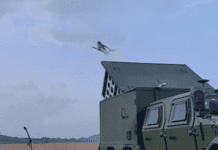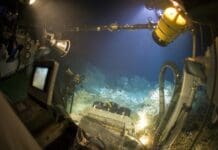This post is also available in:
 עברית (Hebrew)
עברית (Hebrew)
By Arie Egozi
The warming ties between Iran and Turkey add another factor to the new direction Turkey has taken in its defense policy.
In recent months, Turkey has taken a few steps that made the question of whether it can still be a member of NATO a very acute one. The surprising fact is that the organization has not reacted and has not taken any action to try and stop the process. That further puts a question mark on its real value as an organization that may be called for combined military operations.
To all the other factors that shed a big doubt on Turkey’s role in NATO, the closer ties with Iran is seen by Israeli experts as the “final blow” to the Turkish membership in NATO.
The Turkish detachment from the West started with the purchase of the Russian-made S-400 air defense system, went on in negotiations about the purchase of the Russian SU-57 advanced fighter aircraft, and for desert – a declaration about Turkey’s intent to achieve military nuclear power.
The developments are raising big concerns in the U.S and in some European countries but so far nothing concrete has been done to try and change the situation that Israeli experts call “worrying.”
Turkish President Tayyip Erdogan said a few months ago that it was unacceptable that Turkey was barred from having nuclear weapons while other nations in the region have them.
“Some countries have missiles with nuclear warheads, not one or two. But (they tell us) we can’t have them. This, I cannot accept,” he told his ruling AK Party members in the eastern city of Sivas.
In recent months, there are growing signs that Turkey is getting closer to Iran.
That is not surprising. In 2018, Iranian President Hassan Rouhani said “A new era of military and defense cooperation between our two countries has begun.” In the economic sphere, Iran, Turkey, and Russia have signed a three-way deal on oil and gas for drilling in Iran – an important matter for Turkey, which has no significant energy sources within its borders. This positive sentiment comes after years of tension regarding the war in Syria, where Iran has supported the Assad regime with fighters, supplies of weapons, and funding. While Turkey strongly supported the opposition factions fighting against Assad, Iran in effect has ensured the continuation of the regime.
All the Israeli sources that talked on the issue said that the coming months will show if Erdogan is really determined to achieve military nuclear capability.
Erdogan understands the situation and will continue to buy non-U.S weapon systems and make preparations for the launch of a military nuclear program.
The planned accelerated acquisition of Russian and Chinese made weapon systems by Turkey, a NATO member state, will create a major problem for the U.S. “Allowing Turkey to participate in NATO exercises will become a very big security problem,” said Major General (Ret.) Amos Yadlin, former Head of the Israeli Defense Forces Intelligence.
Yadlin, a retired Israeli Air Force high-ranking officer, is now the Head of the Israeli Institute for National Security Studies (INSS). He added that the situation will have to put serious restrictions on Turkey’s participation in NATO joint exercises. “With Chinese-made radar systems, Russian-made S-400 air defense systems and with more such systems to be acquired by Turkey, the restriction on the interface during exercises will have to be very strict.”



























